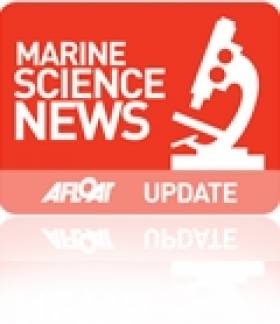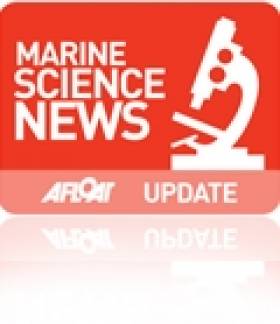Displaying items by tag: Science@Sea
Science@Sea Training Opportunities Onboard RV Celtic Voyager
#MarineScience - The Strategic Marine Alliance for Research and Training (SMART) has opened the call for applications for Science@Sea research vessel-based training courses.
Courses are aimed at undergraduate and postgraduate students of marine-related science, technology and engineering, as well as researchers and professionals working in the marine sector.
The two-day training courses will be held between 4-9 April 2014 in waters off Cork and will offer students the opportunity to gain practical, hands-on experience onboard the national research vessel RV Celtic Voyager.
Science@Sea introduces participants to the concept of a multidisciplinary research approach through immersion in key disciplines. Training addresses the practical, cross-disciplinary skills necessary for marine sampling, data collection and processing.
Participants gain hands-on experience in deployment of a wide range of instrumentation and deck equipment as well as other areas essential to working at sea, including survey design and planning, safety at sea and post-survey analysis and assessment.
“Science@Sea is unique in that it provides participants with the relevant technical knowledge and skills required to work and carry out research at sea. This not only increases national capacity in the marine sector but provides participants with the vital knowledge and skills required for future research and employment," said Dr Pauhla McGrane, national co-ordinator of SMART.
“The hands-on experience that students gain through training provided by the SMART programme is invaluable preparation for the reality of working in a sometimes harsh sea environment across a broad range of marine research,” added Dr Peter Heffernan, CEO of the Marine Institute.
“We’re delighted to support Science@Sea as it gives participants significant practical experience beneficial to their career path, and the SMART programme can contribute towards continuous professional development for professionals with accreditation by IMarEST.”
Applications and further information are available online HERE and queries can be addressed to [email protected].
Completed applications should be received no later than Tuesday 11 March 2014. Please note a course fee of €300 applies for applicants in full-time employment and €50 for full-time students and unwaged graduates with a marine science and technology background.
SMART is a marine science partnership programme that provides quality offshore training for students of marine science, technology and engineering. SMART operates from Galway-Mayo Institute of Technology. Partner institutes include Athlone Institute of Technology, the National University of Ireland, Galway, the Marine Institute, University College Cork and the University of Ulster with supporting funding from the Higher Education Authority. Science@Sea courses are recognised by the Institute of Marine Engineering, Science and Technology (IMarEST) as contributing towards professional development.
Science@Sea is carried out under the Sea Change strategy with the support of the Marine Institute and the Marine Research Sub-programme of the National Development Plan 2007–2013.
Places Open On Science@Sea Training Courses for Marine Students
#MARINE SCIENCE - The Strategic Marine Alliance for Research and Training (SMART) has opened the call for applications for Science@Sea research vessel-based training courses aimed at students of marine-related sciences.
Science@Sea courses have been running since 2008 and are recognised by the Institute of Marine Engineering, Science and Technology (IMarEST) as a means of contributing towards a student’s professional development and career.
The two-day training courses will be held between 7 and 12 November 2012 in waters off Cork and will offer students the opportunity to gain practical, hands-on experience onboard the national research vessel RV Celtic Voyager.
"Science@Sea is unique in that it gives students of marine related sciences a complete guide to working at sea," said SMART national co-ordinator Dr Paulha McGrane. "This not only increases national capacity in carrying out research survey operations but provides graduates with a competitive edge on the national and international jobs market.”
Dr McGrane explained that Science@Sea focuses on practical, cross-disciplinary skills such as sample collection and processing, operation of equipment and instrumentation, and data acquisition and processing.
"Other areas we look at, which are essential to working at sea, include survey design and planning, safety at sea, and post-survey analysis and assessment. To date, students who have participated in Science@Sea have found the course of enormous benefit in securing employment."
Course dates are as follows:
- Postgraduates: 7-8 November 2012
- Undergraduates 1: 9-10 November 2012
- Undergraduates 2: 11-12 November 2012
Applications for Science@Sea and posters advertising the course are available online HERE. Completed applications should be received no later than Friday 5 October 2012.
Please note an administration fee of €50 applies and participants are liable for their own transportation and accommodation costs in Cork. For queries relating to any aspect of the course, contact [email protected]
Science@Sea is provided by SMART, a marine science partnership programme that provides quality offshore training for students of marine science, technology and engineering. The programme is carried out under the Sea Change strategy with the support of the Marine Institute and the Marine Research Sub-programme of the National Development Plan 2007–2013. Core partners include the National University of Ireland, Galway; University College Cork; Galway-Mayo Institute of Technology; Cork Institute of Technology; the National Maritime College; and the Marine Institute; with additional funding by the Higher Education Authority.

























































